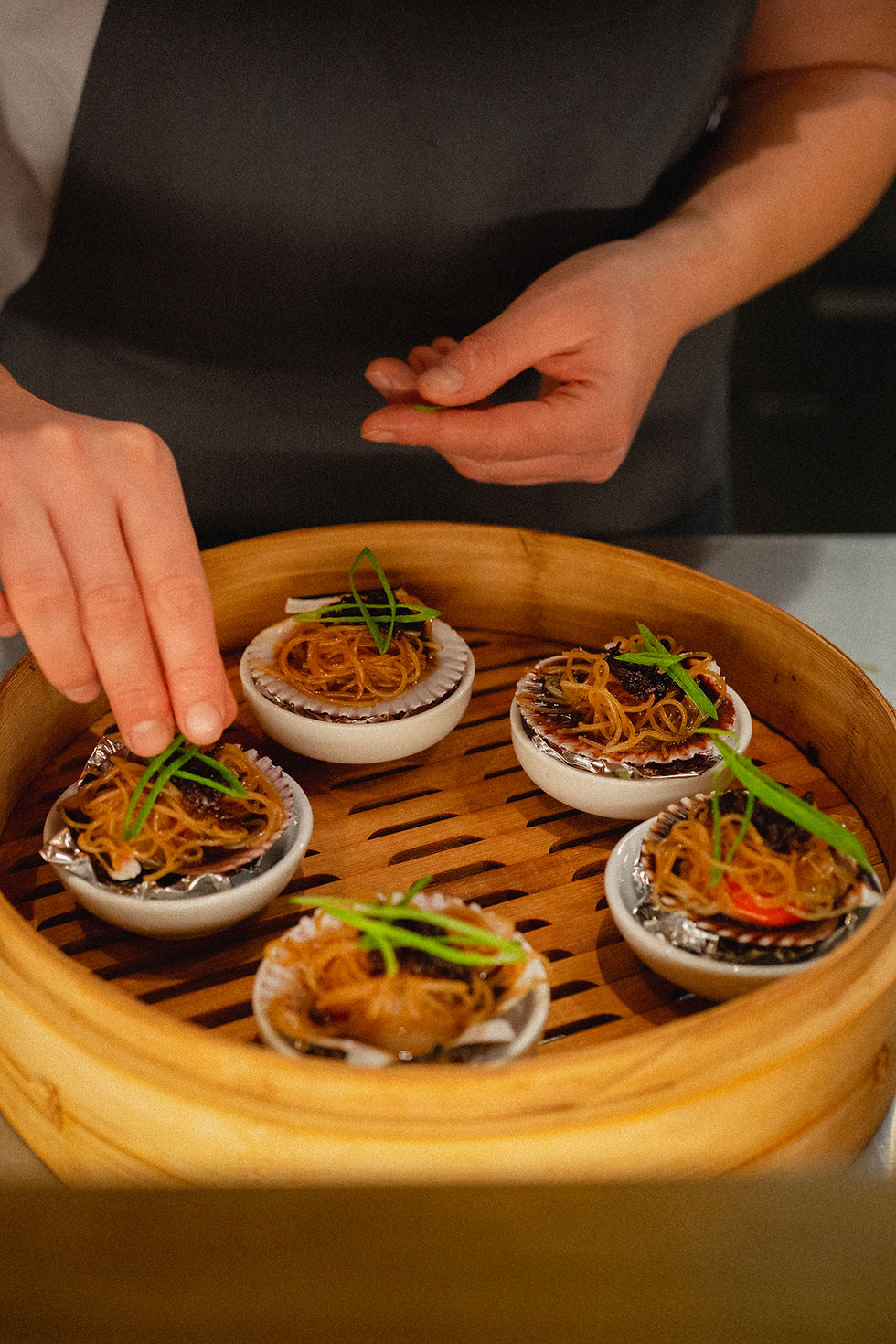Beyond meat and potatoes
- The International
- Sep 18, 2025
- 4 min read

Ophelia Wu delves into Denmark’s vibrant culinary landscape, where gastronomy,
art, and jazz converge to create experiences beyond ordinary dining.
Photographs: Various
Text: Ophelia Wu
Food is a universal language. It connects families and communities in ways nothing else can. When it becomes gastronomy, it elevates not just eating but the entire experience, from concept and creativity to the transformation of humble ingredients.
When Epicurus opened in April, it immediately stood out: a space where art, live jazz, cocktails, and gastronomy meet - the kind of concept you’d expect in New York or London, but new to Copenhagen. Behind it is a powerhouse team: Lars Seier Christensen, co-owner of Geranium (three Michelin stars, World’s Best Restaurant 2022) and Alchemist (two stars), joins Mads Bøttger of Dragsholm Castle Gourmet (one star). “The idea is to create a gathering place for gastronomy and jazz, a relaxed space where the food is not elitist but a tribute to life,” says Bøttger.
They’ve partnered with knighted jazz pianist Niels Lan Doky, famed for collaborations with global luminaries, reviving the city’s long-lost world-class jazz residencies. Completing the group is visionary bar entrepreneur Rasmus Shepherd-Lomborg, who, with his wife Adeline, founded Ruby in 2007 - a bar that sparked Copenhagen’s cocktail renaissance and has featured six times on the World’s 50 Best Bars list.
From local to global
Ask a Dane about the national dish, and you’ll hear fried pork with potatoes and parsley sauce. Yet Denmark has transformed into a gastronomic destination. Friends of mine have flown from San Francisco or Asia solely to secure seats at Noma. Today, Denmark boasts 52 Michelin stars across 38 restaurants, many ranked among the world’s top 50.
Chef Thomas Rode reflects on the “Noma effect,” when alumni spread across the city and the scene exploded. Joakim Thomassen, Restaurant Manager and Wine Director at Restaurant Domæne, notes the impact goes beyond a few elites: “Denmark’s fine dining scene has matured… producing international-level experiences across perhaps the 50 best restaurants.”
Co-owners Lærke Krudt and Michael Nørtoft of Ti Trin Ned observe the same: a “continuous emergence of exceptional restaurants” shaped by sustainability, farm-to-table practices, and respect for nature’s rhythm.
Defining fine dining
What makes fine dining? Not just Michelin stars or price tags, but the balance between concept, creativity, and guest engagement.
Over at Epicurus, Bøttger dislikes the term “fine dining,” which feels “stiff, snobbish and old-fashioned.” For him, hostmanship is central: guests should feel cosy, safe, and able to sense the chef’s effort.
Restaurant Noi's head chef, Matteo Luri, agrees: “It is not only about refinement and luxury, but about creating moments that stay with the guest long after they leave.” Thomassen at Domæne adds that storytelling and attention to detail are key, even in front-of-house choreography.
Rode defines fine dining as “a responsibility to guarantee a certain quality.”
At Restaurant l’Alsace, Franck Dietrich blends founder Franz Stockhammer’s legacy of tradition and innovation. Ti Trin Ned’s Krudt and Nørtoft elevate the idea further: “Fine dining transforms into something more - a craft, a language, a form of artistic expression.”
Restaurant Frederikshøj, Manager Jeppe Lund says: “You must taste the chef's personality on the plate, but the surroundings, atmosphere, and service must come together in a higher unity.” William King Smith, founder of Goldfinch, distils it simply: “All my needs are taken care of… it’s about attention to detail and telling a personal story.”
"Food connects families and communities in ways nothing else can."


The essence of Nordic cuisine
But what exactly is Nordic cuisine? It is broad, like French or Chinese, but defined by ingredients and how chefs work with them.
At Domæne, the philosophy is to focus on one or two perfect ingredients at a time. At Epicurus, menus are planned weeks ahead around the harvest. Frederikshøj insists flavour, consistency, and visual wow must align, with as many local ingredients as possible. Noi’s guiding principle is “seasonality, balance, and authenticity,” minimising waste while refining tradition. As an Italian, Luri notes, “If a dish already has a strong foundation, there is no need to reinvent it completely.”
Across these kitchens, chefs respect nature’s rhythm, letting the season dictate menus. It’s a Danish trait: working with nature rather than against it, elevating even the simplest produce into art.
Between hygge and haute
Denmark has raised the global bar, but chefs balance innovation with tradition. Epicurus may look avant-garde with its blend of jazz, art, and gastronomy, yet it honours Copenhagen’s jazz-booming past.
Hospitality, too, is evolving. Ti Trin Ned defines it as “the rise of the host and the fall of the waiter,” creating personal, intuitive service. At l’Alsace, excellence must coexist with comfort: precision in the kitchen, cosiness in the dining room.
Frederikshøj frames it as hygge: “Service must be professional, but still allow the personalities of our employees. The waiters’ most important task is never to forget hygge.”
Visitors may expect hallmarks of New Nordic cuisine - minimalism, foraging, clean flavours - but find far more diversity. Domæne notes, “The teachings of the new Nordic movement have permeated the industry, but very rarely as a dogmatic concept.” Frederikshøj agrees: “Some might think all fine dining in Denmark is New Nordic… fortunately, the diversity is huge.”
Epicurus echoes the high expectations: “Guests expect local and fresh cuisine, vegetables, fish, and very good hostmanship. Expectations are very high when they travel to Denmark, and they want something unique.”
Ti Trin Ned captures it best: “Our goal isn’t to contradict expectations, but to expand them. That balance between familiarity and curiosity is where the magic happens.”
With chefs blending tradition and creativity, and restaurants balancing hygge with haute, Danish gastronomy has become a cultural force - and a reason to travel all on its own.




